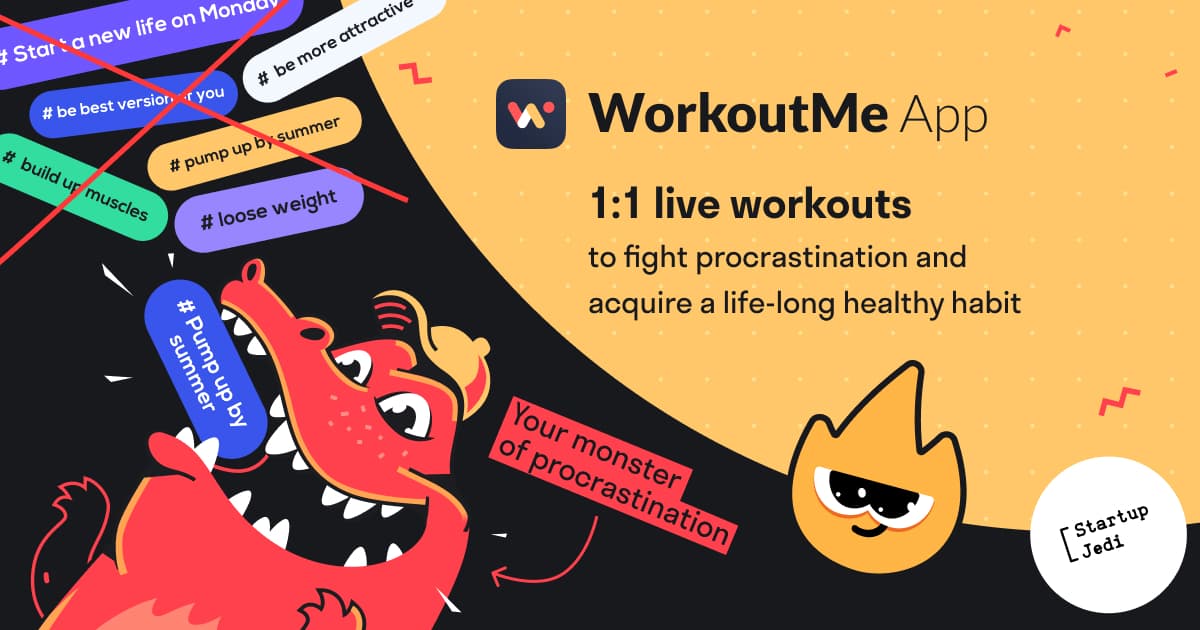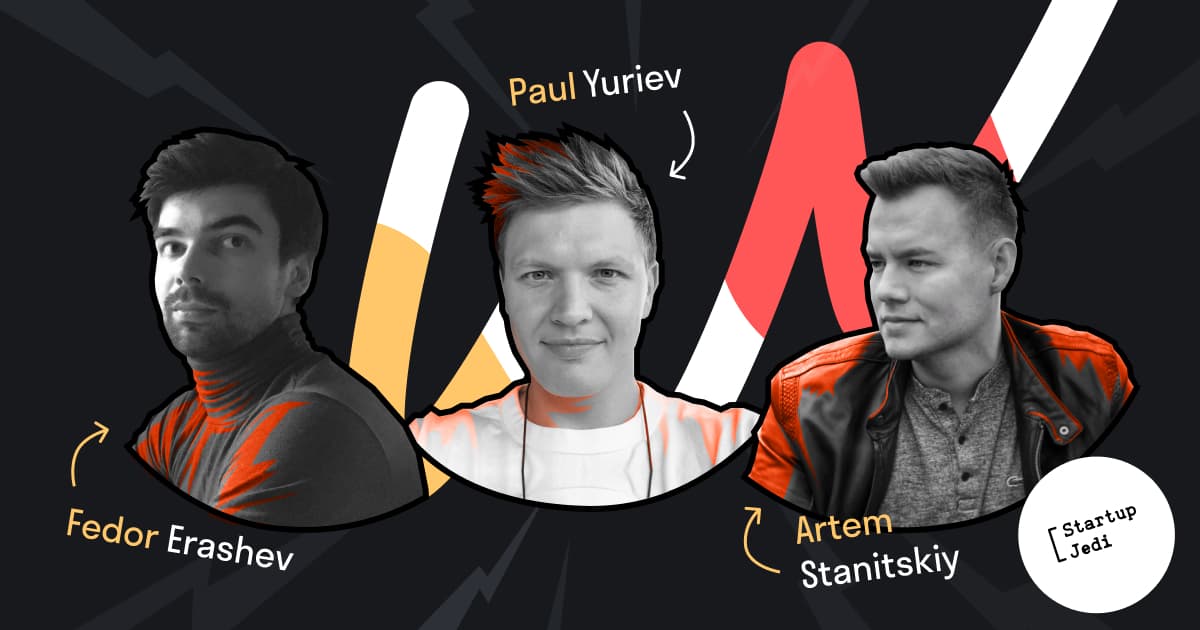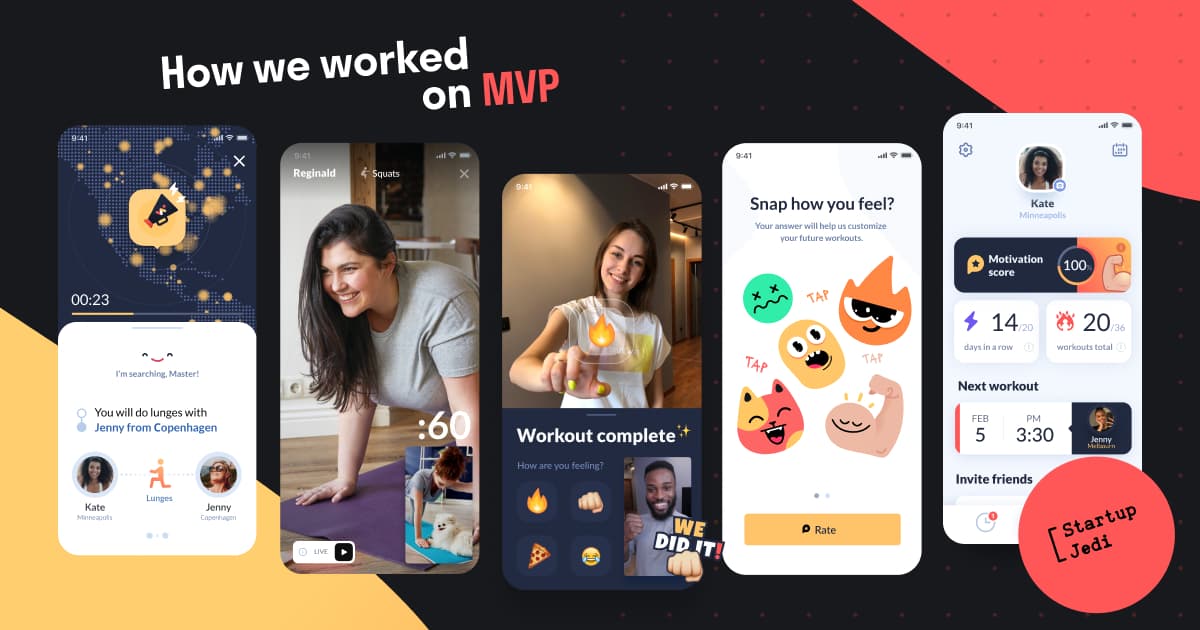
Startup Jedi
We talk to startups and investors, you get the value.
We all install fitness apps on our smartphones from time to time regardless of age, body type and having problems with being overweight. Our motivation is different, but after some time almost all of us end up ignoring or deleting the app. Why is this happening? The problem is often the lack of willpower or time to exercise independently on a regular basis. Everyone wants to be in perfect shape and walk up the stairs without losing your breath, but there will always be reasons why this is impossible at the moment.
A random event during a workout inspired Fedor Erashev — an entrepreneur from St. Petersburg — to help everyone who keeps putting off doing sports regularly because they are lazy. This is how WorkoutMe appeared. It’s a fitness app with an unusual history and unconventional approach. We talked with Fedor about the launch of the project, and he told us how his team created an app prototype on Bubble with zero experience, and how networking and being reasonably frugal helped them save thousands of dollars.

Startup Jedi
We talk to startups and investors, you get the value.
WorkoutMe is a mobile app at the intersection of fitness and social psychology, that helps you have 1-minute-long video exercise with a randomly selected partner. Unlike most fitness applications, WorkoutMe has no programs for 20, 30, or more minutes, but you can workout with a person from another part of the planet, be motivated by their success and challenge yourself. After all, when someone is watching you, you don’t want to fall flat on your face.
...
Before launching WorkoutMe, Fedor managed to gain considerable expertise in entrepreneurship and 5 years of experience in international logistics, financial consulting, and selling businesses. The lack of knowledge about startups did not stop him from creating his own one, to which he has been devoting almost all of his time for the past 2 years.
The idea of WorkoutMe appeared during a home workout. Fedor was about to finish his push-ups, when he suddenly noticed that his girlfriend was watching him, which motivated him to continue the workout. From that moment on, Fedor started working on his startup — a fitness app that motivates people to train by selecting a partner and playing sports together.
Social facilitation (refers to the finding that people sometimes show an increased level of effort as a result of the real, imagined, or implied presence of others — Startup Jedi) works especially well for understandable things, such as simple fitness exercises. It is this mechanism at the junction of a healthy lifestyle and social psychology that has become the cornerstone of the startup.
— I started thinking about the format that would allow us to test the idea straightaway. I was also studying everything related to fitness projects. Having no competence and contacts in IT didn’t stop me and I organized a marathon to start building my IT network.
Besides studying resources available on this topic, I used all the opportunities I could think of. I wrote “cold” direct messages to the right people on Facebook, I used Random Coffee (a service for casual meetings over a cup of coffee with strangers from the IT industry — Startup Jedi) and Mesto (a new community for the joint creation of new companies and products — Startup Jedi) to get to know the people who are useful in terms of competence and networking.
Fedor held 5–10 meetings weekly, trying to understand the values of the people he was talking to, their competence and unique experience. He was exploiting the particularities of the IT field and how everything works there. He pitched and thus identified weak points in the original idea. It was sort of a CustDev when the product did not yet exist, but the needs of a possible audience had already been partially clarified. Thus, within two years, with the help of the emerging network, the idea was tested and the hypothesis was checked.
Once we got an idea of what the product prototype should look like, Fedor independently made its basic version (still having no experience in IT) on Bubble. Now it is clear that it did not look very well, but the application logic and screens actually worked. Yet, he lacked competence to develop an algorithm for selecting partners for joint training, which made it clear it was about time he found a team.
...

— I wanted to enjoy what I do and who I am creating the product with. When selecting co-founders, I set up my filter to search for “chemistry” between people — how comfortable, interesting, pleasant it is to communicate and work together, as well as how similar our values are, and hard skills were secondary to me. I learned how to get many issues sorted with the help of your network: either by buying competencies or by getting the necessary expertise for free.
It took about 10 months to find the first partner — it was the project’s CMO Pavel Yuriev, an excellent specialist in marketing and traffic, with deep product knowledge, a large background and a good network in IT, which is exactly what Fedor lacked to further develop the startup. It was Pavel who helped bring two more co-founders to the project: Head of Design Artem Stanitsky and CTO Stanislav.
Four professionals, as it turned out, are quite enough to make the first version of WorkoutMe without raising investment. And they were making a well-functioning MVP from day one, with a strong emphasis on design and creativity, making sure the users like what they see.
In February 2021, the first employee, product and project manager Angelina Dmitruk, joined the project. There are also guys who help the project part-time with testing the application, development, design, translations of articles and texts, and get their expertise in marketing and working in the App Store from the network.
In general, the whole team has an excellent background in IT, and they are very expensive specialists.
...

Teamwork on the first version started in February 2020. In April the team started development, creating the first application architecture and prototype, as well as testing the hypothesis of social facilitation. To do this, a chat of several dozen unfamiliar people was created in WhatsApp. Then they were manually paired up for joint online training.
For several weeks, people did one minute of workout every day in pairs. In the course of the experiment, the maximum number of possible metrics was collected. Besides surveys, the team collected information about participants who missed the workout, rejoined participants, as well as their impressions of joint exercises. All of this was entered into a daily updated table. They received a lot of insights on what the first version of the product should contain, what is important and what is not.
— I also took part in the experiment and exercised with the guys every day. Many of the participants had better results when training in pairs. From my own experience, I can say that my usual plank time of 1 minute extended to 1.5 or even 2 minutes when working out with a partner. We encouraged each other, which motivated us a lot.
The hypothesis of social facilitation during the experiment was confirmed: people really did more than they expected of themselves. However, it is possible that on a larger scale this assumption may not work and will require additional research.
The first version of the iOS app appeared on November 1, 2020. It still contains only about 5% of the planned functionality.
The user flow in the product now looks like this:
By when you click on the Workout button, the application asks who you want to train with: a random partner or a friend;
Then the user can choose one 1-minute random exercise or a set of 3 to 10 minutes for different muscle groups and different levels of difficulty;
Then the app finds you a partner, turns on a 5-second video that demonstrates how to perform the first exercise;
A “room” opens, where partners see and hear each other, they have a few seconds to get to know each other;
The timer turns on when both users are ready to start training and click on a special button for this;
When time runs out, there is still a minute left to thank your partner for the workout.
In the future, the product will include gamification tools with achievements and grades that will open access to partner products, live streams with fitness influencers and trainers, as well as group workouts with friends and colleagues.
...

If everything goes as planned, the application will solve the main problem of the Health & Fitness market — low retention.
— Naturally, one minute is not enough to keep in good shape. At the same time, we saw a certain pain point: the average retention of the 7th day according to the AppsFlyer report in the US for sports apps is 6.4%. This means that after 7 days over 90% of people either uninstall the application or simply stop opening it. This is a big pain that affects what business model companies build and what happens with products.
We developed WorkoutMe in a way that allows users to acquire a useful habit gradually, without spending a significant amount of time on it at first. It is very difficult to find an excuse for not having enough time to practice if, in fact, it only takes one minute to train. Understanding this, the user can do some sports during the day.
Inside the application, there can be a large set of exercises for 1 minute, and in the future, a workout can last 5–10 minutes or more, depending on the user’s request. The idea is that it is better to regularly exercise for at least one minute a day than for an hour, but once a month. This 1 minute is more likely to turn into a habit over time.
...
The day after its release in the App Store, the app appeared on Product Hunt. That’s how we got our first audience, who liked the product and gave us a lot of feedback.
WorkoutMe was ranked 4th Product of the Day and 6th Product of the Week, and was also a finalist for the 2020 Golden Kitty Award in the Mobile App of the Year category.
— For us, this was the first time we got the bulk of users. But we’ve never aimed to gain an audience for the sake of an audience. Instead, product metrics are important. On average in the market, they are very low and the question is whether we can increase them with other users. Those who came from Product Hunt had 14% retention on the 7th day, which is twice the market, but still lower than many other companies that have been working in the Health & Fitness segment for a long time. At the same time, this is a good level for the first version of the product. The audience comes to us from other free sites on which the project profiles were created, part of the “organic” came from the App Store. Now we have about 2,000 active users: 40% of them are from the USA, 40% are from Russia, 20% are from Europe and Asia.
...

Over the next 6–9 months, the team plans to create a product that will give the maximum possible Social Value (Social values are what is significant and important, what society wants and appreciates. They perform the function of moral regulators of people’s behavior and allow the individual to develop an internal position in relation to the outside world and to their actions — Startup Jedi). In terms of audience, the team expects to have approximately 100 000 users by the end of the year.
— It is important for us to finalize the project so that these users have a high retention of the 1st, 7th, 30th day. This is more valuable than just the number of users.
Along the way, the team is testing another hypothesis — that the product can be useful and have value for companies. Now we are working on the b2b version. Pilot products are made for business for free, so any company can contact us and get the opportunity to try a business account in WorkoutMe.
— During the pandemic, we saw that we can provide some value for companies as well. For example, you can create your own community on our platform, where company employees will train with each other. Now, this hypothesis is being validated, we believe that such an approach will help solve the problem of social integration, team building, adaptation of new employees in the conditions of remote work.
...
— Our main competitors are procrastination and Netflix. Just like the main competitor of Netflix is sleep. We keep in mind that people spend time watching Netflix and put off their workouts, meaning they do not exercise. If we talk about companies that we personally like and that we are ready to make friends with — these are, of course, BetterMe and Verv.
...

— When it comes to the financial side of a startup, we are committed to lean culture. We do everything that we can ourselves, try to get things for free or accept them on certain conditions, for example, expertise. Therefore, for the 6–7 months of development before the release in the App Store, we spent a total of about $1 000, excluding our own labor costs, of course.
In early April 2021, the startup raised $150 000 in Pre-seed round. Our investors were Dmitry Morozov — founder and CEO of an international publisher Green Grey; Mikhail Goryunov — co-founder of 3Commas; business angels Alexander Rusanov and Gordey Borodin; Alexander Lebedev — the founder of AppLife; Anna Nikishina — co-founder of the venture studio Around.Capital. We found all investors with the help of our network.
— We started working on raising investments when we understood exactly what we needed them for. The whole process with the period of fundraising, opening the company, documents and negotiations took about 1.5 months, despite the fact that we received the main commits in several meetings.
...
The startup team plans to develop its product and increase both the number of users and their involvement. To achieve these goals, we’re considering the following ideas:
Adding achievements and grades to the application, and thus integrate gamification mechanics. When you unlock a certain “achievement” in the application (let’s say, 50 workouts), you can practice with a celebrity, for example, Miley Cyrus. Another great motivation is to get a 50% discount on a well-known brand such as Nike sneakers. To accomplish this, the startup is open to external partnerships;
Enabling group training with friends;
Providing an opportunity to switch from 1-minute workouts to full 3–10-minute sets of 6–7 exercises for different muscle groups;
Introducing a system of daily individual tasks that will help instill a healthy habit;
Providing an opportunity for single workouts for those who are not yet ready to practice one-on-one with other people, but want to “try-out” the functionality of the application;
Adding tools for streaming workouts — that’s why the startup team is now actively looking for influencer partners.
3 tips for budding startups from Fedor:
Team and people are what matters. This is the largest source of knowledge you can use. It is important to learn to build relations and find synergies between people. Even if it seems that a person is useless to you, at least they will be able to tell you what not to do or how not to think. Therefore, I recommend that guys, whose project is still at an early stage, surround themselves with people as much as possible and build their own network.
You need to understand that working on a startup is a marathon, not a sprint. You probably can get quick results — some people have. But I decided for myself that this is a long story. Sometimes you don’t earn money, it might be energy-consuming, but you know there is a chance that everything will work out.
You need to be as honest, conscientious and negotiable as possible. This set of soft skills can make the team very strong, and lack of them can bury the project at the very beginning.
Facebook: facebook.com/StartupJedi/
Telegram: t.me/Startup_Jedi
Twitter: twitter.com/startup_jedi
Comments